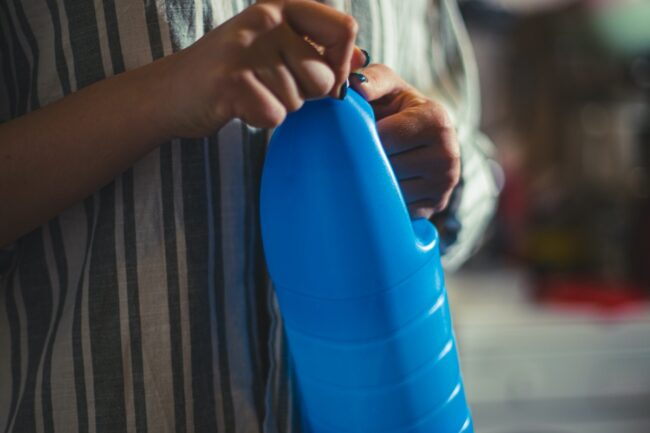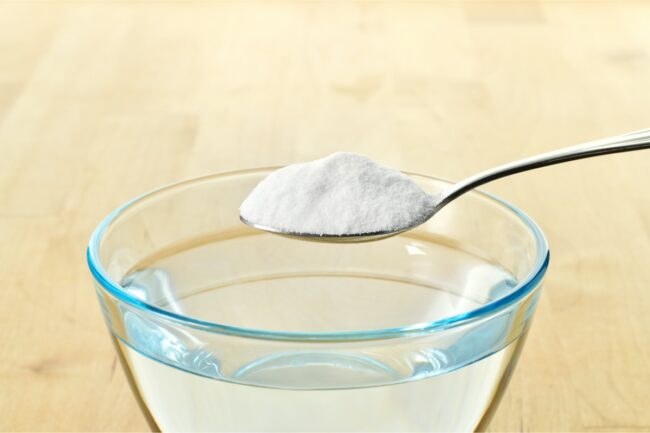Step 5: If the dishwasher has mold and mildew, consider cleaning it with bleach.
This step is optional. Complete this step only if the dishwasher still has mold after completing the previous steps.
If the dishwasher suffers a nasty mold attack, vinegar will kill the mold, but in severe cases, the cleaning power of bleach may be needed. Never use bleach in a dishwasher that has stainless steel interiors or stainless steel parts. Bleach and stainless steel do not get along easily. If mold remains in the stainless steel dishwasher after running the wash cycle, follow the instructions in step 2 to try the vinegar cycle again.
For dishwashers that can be cleaned with bleach, place 1 cup of bleach in the bottom of the dishwasher or place 1 cup of bleach in the dishwasher safe container on the top rack and run a full cycle on the hottest setting.

Step 6: Add this cleaning routine to your family calendar.
Repeat these steps every month or two, and you’ll have this hard-working machine doing your worst chores for years of use. Another tip: When cleaning your dishwasher, don’t forget to wipe down the sides and top of the door, as well as the seal between the door and the bucket. Remember, a clean dishwasher is an effective dishwasher.

How to clean your dishwasher with vinegar and baking soda
White vinegar is a natural cleaner with many talents that can solve the two main problems that often plague dishwashers: clogging and odors. Vinegar solves everything that could potentially clog the pipes and cause your dishwasher to underperform one day, including removing grease from the inside of the dishwasher, removing old detergents, and even dissolving mineral ingredients. White vinegar also neutralizes food odors, which is an added benefit because it makes the dishwasher smell less unpleasant.
Like vinegar, baking soda is great for removing odors, but it also works well on stains. Baking soda is a light abrasive, so it is effective at loosening up dirt and accumulated grime. When you clean your dishwasher with vinegar and baking soda, you’re aiming for a powerful one-two punch against food deposits, grease and odors that build up in the dishwasher over time.
You can achieve the same results when cleaning your dishwasher by replacing the vinegar with a packet of unsweetened lemonade mixture. Simply add the powder to the detergent dispenser and run the cleaning cycle. The citric acid in the lemonade mixture works in the same way as vinegar to reduce residual food residue.
When purchasing lemonade mixes, look for unsweetened lemonade and make sure the citric acid is on the ingredient list. Avoid flavors like strawberry or raspberry because they can mess up, so don’t get too fancy. If you don’t have a lemonade mixture, try adding a cup of lemon juice to the dishwasher bowl and washing it on the top rack of the dishwasher.
Tips for keeping your dishwasher clean
Now that you know how to clean your dishwasher, the best way to keep it looking good and functioning is to treat it with respect and care day in and day out.
By following a few simple usage guidelines, you can get the best possible performance from this workhorse and extend its life.
Dishwashers share a drain with the kitchen sink. If you are using a disposal, run the disposal and make sure the drain is clean before you start washing.
It’s wise to run the dishwasher only when it’s full to save electricity and water, but resist the temptation to stack dishes too high or put them away too tightly. However, stacking dishes too high or putting them away too tightly can prevent water from getting to every corner of the dishes and preventing them from getting completely dirty.
Avoid pre-washing dishes too thoroughly before putting them in the dishwasher. In order for the detergent to work effectively, there must be some grease or food residue left behind. Otherwise, the detergent will just foam up during the wash, and excess foam can have a detrimental effect on the equipment.
Final thoughts.
If you’ve ever wondered how to clean a dishwasher, you know the best way to tackle the task. To maintain dishwasher performance and eliminate odors, clean it once every one to two months. Cleaning the dishwasher is easy. Simply remove all dishes, use a natural detergent such as white vinegar, baking soda or lemon juice, and run the cleaning cycle. Add an unsweetened lemonade mixture to the detergent dispenser; the citric acid will reduce grease and grime.
If your dishwasher has stubborn mold and mildew, add a cup of bleach and wash it on the top rack. However, do not do this if the dishwasher has a stainless steel interior or has stainless steel parts. The bleach will damage the stainless steel surface.
If, despite your best efforts, your dishwasher is performing poorly or the interior is starting to crack or rust, it may be time for an upgrade. Replacing it has benefits. Newer models tend to be quieter, and they are more stingy with water and energy.
CLICK NEXT PAGE BELOW TO CONTINUE READING …









